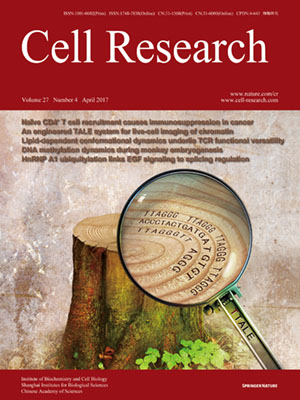
Volume 27, No 4, Apr 2017
ISSN: 1001-0602
EISSN: 1748-7838 2018
impact factor 17.848*
(Clarivate Analytics, 2019)
Volume 27 Issue 4, April 2017: 461-482 | Open Access
ORIGINAL ARTICLES
Blocking the recruitment of naive CD4+ T cells reverses immunosuppression in breast cancer
Shicheng Su1,2, Jianyou Liao1, Jiang Liu1,2, Di Huang1,2, Chonghua He1,2, Fei Chen1,2, LinBing Yang1,2, Wei Wu1,2, Jianing Chen1,2, Ling Lin3, Yunjie Zeng4, Nengtai Ouyang4, Xiuying Cui1,2, Herui Yao1,2, Fengxi Su1,2, Jian-dong Huang5, Judy Lieberman6, Qiang Liu1,2 and Erwei Song1,2
1Guangdong Provincial Key Laboratory of Malignant Tumor Epigenetics and Gene Regulation, Medical Research Center, Sun Yat-Sen Memorial Hospital, Sun Yat-Sen University, Guangzhou, Guangdong 510120, China
2Breast Tumor Center, Sun Yat-Sen Memorial Hospital, Sun Yat-Sen University, Guangzhou, Guangdong 510120, China
3Department of Internal Medicine, The First Affiliated Hospital, Shantou University Medical College, Shantou, Guangdong 515041, China
4Department of Pathology, Sun Yat-Sen Memorial Hospital, Sun Yat-Sen University, Guangzhou, Guangdong 510120, China
5Department of Biochemistry, the University of Hong Kong, Hong Kong, SAR, China
6Department of Pediatrics, Program in Cellular and Molecular Medicine, Boston Children's Hospital, Harvard Medical School, Boston, MA, USA
Correspondence: Erwei Song, E-mail: songew@mail.sysu.edu.cn; Qiang Liu, E-mail: victorlq@hotmail.com; Judy Lieberman,(judy.lieberman@childrens.harvard.edu)
The origin of tumor-infiltrating Tregs, critical mediators of tumor immunosuppression, is unclear. Here, we show that tumor-infiltrating naive CD4+ T cells and Tregs in human breast cancer have overlapping TCR repertoires, while hardly overlap with circulating Tregs, suggesting that intratumoral Tregs mainly develop from naive T cells in situ rather than from recruited Tregs. Furthermore, the abundance of naive CD4+ T cells and Tregs is closely correlated, both indicating poor prognosis for breast cancer patients. Naive CD4+ T cells adhere to tumor slices in proportion to the abundance of CCL18-producing macrophages. Moreover, adoptively transferred human naive CD4+ T cells infiltrate human breast cancer orthotopic xenografts in a CCL18-dependent manner. In human breast cancer xenografts in humanized mice, blocking the recruitment of naive CD4+ T cells into tumor by knocking down the expression of PITPNM3, a CCL18 receptor, significantly reduces intratumoral Tregs and inhibits tumor progression. These findings suggest that breast tumor-infiltrating Tregs arise from chemotaxis of circulating naive CD4+ T cells that differentiate into Tregs in situ. Inhibiting naive CD4+ T cell recruitment into tumors by interfering with PITPNM3 recognition of CCL18 may be an attractive strategy for anticancer immunotherapy.
10.1038/cr.2017.34
FULL TEXT | PDF
Browse 2358


